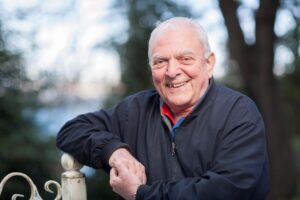Şanar Yurdatapan is a writer, composer and spokesperson for the Initiative for Freedom of Expression-Turkey – a peaceful “movement of civil disobedience that is breaking anti-democratic rules.” The award-winning activist is currently on trial for “promoting terrorist propaganda” after having signed a statement in support of a teacher who pleaded for more media attention on the abuse of civilians in southeast Turkey.
Last Updated: 3 October 2016 TURKEY

In a message to IFEX in October 2016, Şanar Yurdatapan described what it was like to be a part of the global network defending and promoting free expression:
Meeting with IFEX and being a part of it has changed a lot in our relations with the world. Besides the direct support to our projects, IFEX gives us the possibility to contact freedom of expression activists on other continents, exchange experiences and support – even participate in – each other’s activities.
Şanar Yurdatapan is a writer, composer and spokesperson for the Initiative for Freedom of Expression-Turkey – a non-profit organisation with no executive committee and no legal structure that defines itself as a “a movement of civil disobedience that is breaking anti-democratic rules.” The group has been a member of IFEX since 2007.
Born in Susurluk in 1941, Yurdatapan became politically active in the 1960s, when he got involvedwith the Turkish Labour Party. In the 1970s, he became famous for his pop music compositions. Hisaward-winning song “Arkadaş” – written for a film by the same name – is still performed to this day.
In 1980, Yurdatapan and his (ex)-wife Melike Demirag were forced into exile for more than 11 years, during which time they were stripped of their Turkish citizenship. While in exile, music became an important platform for Yurdatapan’s commitment to free expression and advocacy. In 1982, he recorded “Songs of Freedom from Turkey: Behind Prison Bars,” a protest album that can be found in many libraries today.
They were granted amnesty and allowed to return back to Turkey in 1991. With their citizenship returned to them the following year, it did not take Yurdatapan long to launch into activism again.
In 1995, renowned novelist Yasar Kemal was charged under the anti-terror law for a Der Spiegelarticle about the oppression of the Kurdish population in Turkey, prompting Yurdatapan and other activists to stage a unique form of civil disobedience. More than 1000 intellectuals wrote down their names as the publishers of a book containing banned texts – including Kemal’s – and informed the State Prosecutor of their “crime” and forming “queues of expression” outside his office. A mass case was subsequently opened against 185 of those individuals, drawing attention to Kemal’s case, and censorship at large.
The creativity imbued in this act of civil disobedience has become a staple of Yurdatapan’s continued fight for free expression.
In 2003, Yurdatapan, who identifies as an atheist, and Abdurrahman Dilipak, an Islamist theologian, co-published “Opposites: Side by Side.” Divided into two parts, the book allows both authors to discuss controversial topics like gender, faith, human rights and fundamentalism. “We wanted to show that we could live together with our differences, holding onto them.”
Yurdatapan’s innovative approach to advocacy of free expression does not end there. In 2014, he and his colleagues founded the Museum of Crimes of Thought, a digitised campaign project that documents free expression abuses in Turkey.
The digital space allows visitors to navigate the halls like a tourist in an actual museum. They can see the office of State Prosecutor, step inside a realistic depiction of a Turkish courtroom, and learn more about how Turkish law has been to stifle press freedom.
But Yurdatapan’s most recent form of activism did not occur online – and its consequences extend far beyond the reach of our screen. On 23 September 2016, Yurdatapan and 30 other activistsattended their first trial for signing a statement in support of Ms. Ayşe Çelik, a teacher from Diyarbakir, a Southeast province in Turkey, who publicly pleaded for more media attention to killings and other abuse against civilians ongoing across southeast Turkey. If convicted, Çelik, Yurdatapan, and the other signatories of the statement could face up to 7.5 years in prison for “promoting terrorist organisation propaganda.”
On the day of the trial, organisations from all over the world stood in solidarity with Yurdatapan and his co-defendants by staging small protests outside of their Turkish embassies or consulates. Activists from Azerbaijan, Belgium, Belarus and Kazakhstan attending the OSCE meeting in Warsaw also expressed their support for Yurdatapan and his co-defendants by holding signs saying “If Ayşe is a criminal, I am too.” The next hearing is scheduled for 30 November 2016.
If Yurdatapan is convicted, it will be his fourth time facing imprisonment, having been detained in1996, 1997 and 2000 as a result of his peaceful activism. In spite of this, he continues to inspire others with his determination, humour and creativity in his campaign for freedom of expression in Turkey.
Yurdatapan’s courage and commitment to free expression has not gone unnoticed. International recognition of his work includes the 2002 “Circumvention of Censorship” Award by Index on Censorship and Human Rights Watch’s “Global Human Rights Defender” award. He is also the recipient of Turkish freedom of expression awards from the Human Rights Association, The Association of the Oppressed and the Association of Modern Journalist.
A sonata of solidarity: Şanar Yurdatapan
3.10.2016 Website of IFEX (International Freedom of Expression Exchange)
61

